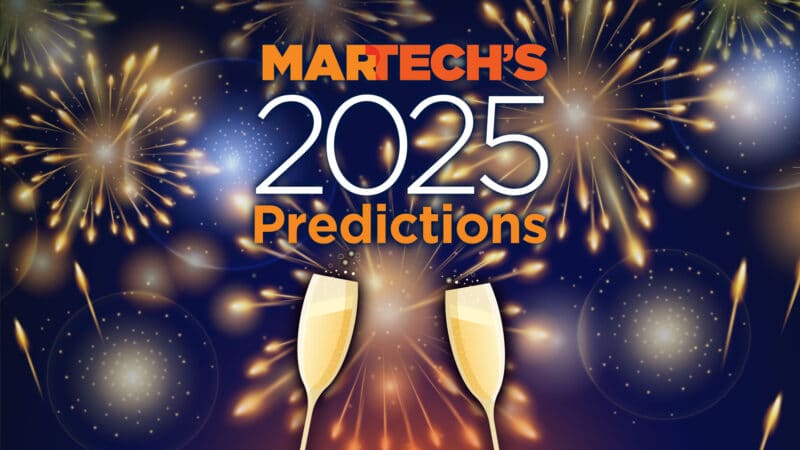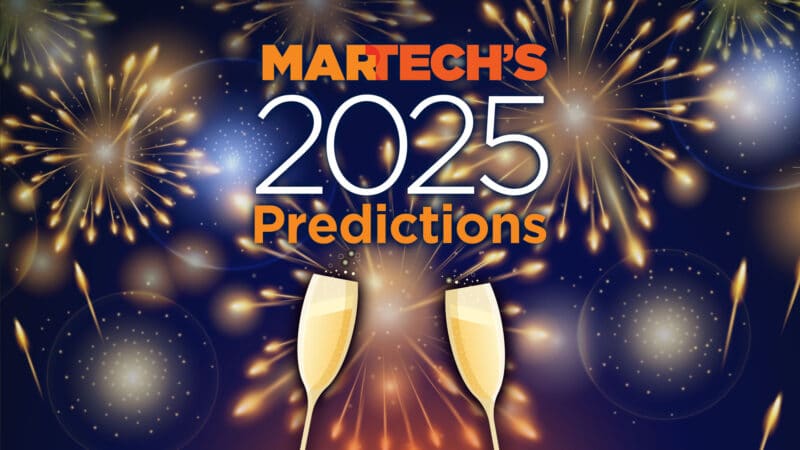
- B2B marketing
- B2C marketing
- Content management systems (CMS)
- Content Marketing
- Customer data platform (CDP)
- Customer relationship management (CRM)
- ecommerce
- Marketing artificial intelligence (AI)
- Marketing automation
AI transformation: 2025 predictions

This past year saw lots of potential with all kinds of AI-powered tools and updates. Studies also show that marketers are upskilling and organizations plan to continue to invest in AI in the coming year. There’s plenty of transformation underway — but what does this mean practically?
It means many businesses will be making new hires to support change. And they will be using data and other marketing assets in new ways to remain competitive in this changing environment. Here are some areas where organizations will be adapting and leveraging AI tools and processes in 2025.
AI councils and Chief AI Officers
With the influx of AI-powered tools and processes available on the market, businesses will aim to adapt with new hires and restructuring. Many businesses will form AI councils or hire Chief AI Officers to lead AI transformation.
“I expect these initiatives and hires to proliferate in 2025,” said Eric Williamson, CMO of conversation intelligence company CallMiner.
Williamson explained: “On the one hand, educated adoption decisions can help ensure that your AI investments are delivering the value you expect, whether that’s improving CX, driving operational efficiency, supporting contact center agents, or other goals. On the other hand, having an unnecessary number of decision makers involved can slow or even halt procurement processes, causing organizations to fall behind the AI curve. Organizations must find the balance between agility and responsible AI adoption if they’re going to remain competitive.”
Dig deeper: How to reframe AI adoption to focus on outcomes, not tools
Automating data analytics and enrichment
One of the primary ways marketers will be leveraging AI in 2025 is to enrich and analyze their data. For instance, AI-powered tools can reduce time and increase the efficiency of scoring and identifying ideal customer profiles (ICP) — those customers or prospects with the highest likelihood of being big spenders.
“I’m excited about how AI is helping modernize the way marketers, especially in B2B, approach the age-old issue of ICP analysis and account data enrichment,” said Gurdeep Dhillon, CMO of Contentstack, a composable CRM. “The new ways to approach determining ICP, as well as automating account data and research, will help marketing and business development scale and leverage their tech stack more efficiently.”
The ability to analyze and activate quickly using AI-powered capabilities will have implications across the martech stack. As this applies to customer experience, marketers will have the firepower to execute hyper-personalization. They’ll have the real-time data insights, and genAI content production to rapidly deliver hyper-personalized messages and experiences.
“The number one use case I see is finally delivering on the promise of personalization,” Dhillon said. “Real-time audience and content insights combined with on-brand genAI will make hyper-personalization at scale a reality.”
Dhillon added: “Marketers will use modern DXPs with the CMS, Personalization Engine, real-time CDP, LLMs plus RAG (retrieval-augmented generation), and automation tools to accomplish this. The biggest challenge marketers will face will be setting up the personalization logic to start with. AI will help refine and optimize, but the team needs to set the initial strategy.”
Dig deeper: The AI-powered path to smarter marketing
Redefining content optimization for genAI retail search
If you’re in ecommerce, AI is already changing the playing field through genAI search tools like Amazon RUFUS. Customers aren’t just using keywords to find products and brands, they’re searching more conversationally. This means customers are asking general questions, describing occasions for shopping, asking about product comparisons and asking follow-up questions.
To keep up and remain a top result in this environment, marketers will have to optimize content to cover a broader range of contexts.
“GenAI retail search will bring a renewed focus on content optimization and increased content refresh requirements,” said Megan Harbold, VP strategy and growth for omnichannel marketing platform Skai. “GenAI search, like RUFUS, will move out of testing and into the normal behavioral flow of online shopping.”
Harbold explained: “Marketers will need to evolve how they keyword harvest, optimize product content, and contextually target in order to remain relevant as the models refine the definition of search. This will result in increased investments in technology to optimize product content and dynamically change content and creative as contextual targets are refined.”
Integrating causal AI
In the new year, AI won’t just be used to scale up analytics and content creation. AI will also be used to analyze scenarios and help make decisions. This is the category of AI tools referred to as “causal AI.”
Dig deeper: Why causal AI is the answer for smarter marketing
“Without question, in 2025 and beyond, much energy will be expended on integrating causal AI with generative AI and large language models,” said Mridula Rahmsdorf, CRO at IKASI, a causal AI company with tools for retailers and financial services. “Current machine learning models are still extremely useful across multiple disciplines and are scheduled for an upgrade in the coming year. Causal AI — integrated with these forms of AI — will greatly improve accuracy and enhance decision-making, particularly when decision-making involves multiple and seemingly conflicting indicators based on correlations rather than causal relationships.”
Rahmsdorf adds: “Integration of causal AI will also boost generative AI’s reliability by giving it a deeper and broader grasp of how different factors interact and affect one another. As a result, look to generative AI to be more adept at presenting scenarios that reflect realistic outcomes, leading to more coherent and relevant results.
“As causal AI becomes more deeply integrated into other AI technologies and confidence in causal inference rises dramatically based on accurate results, there will be a sharp increase in using it to help make material impact in various use cases across verticals.”
The post AI transformation: 2025 predictions appeared first on MarTech.



